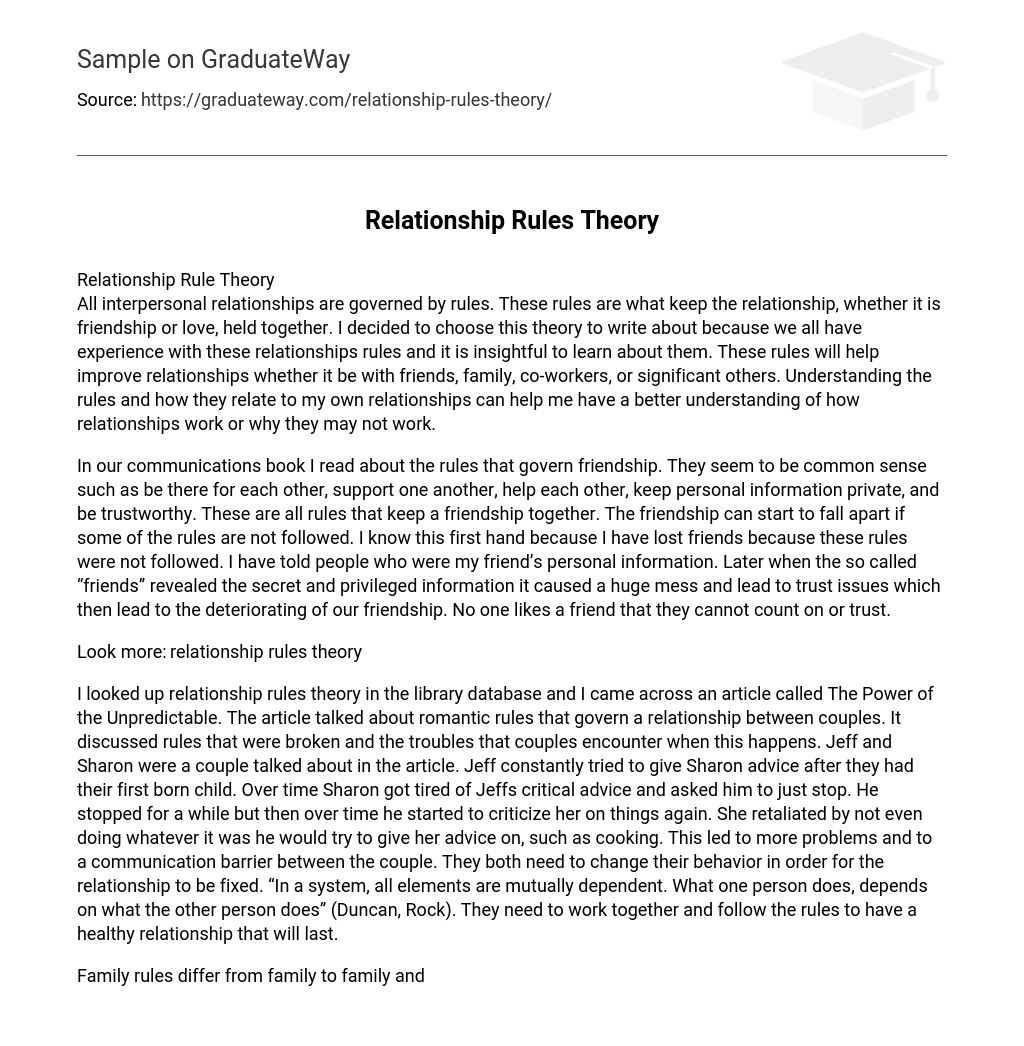Relationship Rule Theory
All interpersonal relationships are governed by rules. These rules are what keep the relationship, whether it is friendship or love, held together. I decided to choose this theory to write about because we all have experience with these relationships rules and it is insightful to learn about them. These rules will help improve relationships whether it be with friends, family, co-workers, or significant others. Understanding the rules and how they relate to my own relationships can help me have a better understanding of how relationships work or why they may not work.
In our communications book I read about the rules that govern friendship. They seem to be common sense such as be there for each other, support one another, help each other, keep personal information private, and be trustworthy. These are all rules that keep a friendship together. The friendship can start to fall apart if some of the rules are not followed. I know this first hand because I have lost friends because these rules were not followed. I have told people who were my friend’s personal information. Later when the so called “friends” revealed the secret and privileged information it caused a huge mess and lead to trust issues which then lead to the deteriorating of our friendship. No one likes a friend that they cannot count on or trust.
Look more: relationship rules theory
I looked up relationship rules theory in the library database and I came across an article called The Power of the Unpredictable. The article talked about romantic rules that govern a relationship between couples. It discussed rules that were broken and the troubles that couples encounter when this happens. Jeff and Sharon were a couple talked about in the article. Jeff constantly tried to give Sharon advice after they had their first born child. Over time Sharon got tired of Jeffs critical advice and asked him to just stop. He stopped for a while but then over time he started to criticize her on things again. She retaliated by not even doing whatever it was he would try to give her advice on, such as cooking. This led to more problems and to a communication barrier between the couple. They both need to change their behavior in order for the relationship to be fixed. “In a system, all elements are mutually dependent. What one person does, depends on what the other person does” (Duncan, Rock). They need to work together and follow the rules to have a healthy relationship that will last.
Family rules differ from family to family and from culture to culture. Family is a huge part of my life. My mom and older sisters are my best friends. We have family rules that we live by that make our family work out well. We are a very open family and we are all very much involved in each others business. This brings us closeness to one another. All families have family rules that are understood. You know what kind of behavior your family will reward you for and you also know what kind of behavior they would punish you for. In my family I would be rewarded for having good grades, thus stating academics is important to my family. I would be punished if I were to be arrested, thus following the laws is also important to my family.
The last part of the relationship rules theory has to do with relationship rules in the workplace. I find these ones to be the most common sense based. Most work places have a very professional feel. Your behavior should match the situation of your job. Watch what other employees do to know what kind of behavior is allowed and what is frowned upon. Be respectful and obedient to those who are positioned above you. Stay away from behavior that could be observed as sexual harassment.
Relationship rules are necessary to obtain healthy happy relationships. Although they may seem to be common sense it is important to know the rules. Knowing the rules can help detect a problem in the relationship and having knowledge on the subject can lead to the repair within a certain relationship. Just like with Jeff and Sharon, recognizing what the problems were in their relationship and applying these rules, can make all the difference.
Works Cited
DeVito, Joseph A. Human Communication: The Basic Course, Twelfth Edition. Boston.Pearson Education, Inc., 2012, 2009, 2006. Print. Duncan, Barry L., and Joseph W. Rock. “The Power Of The Unpredictable.” Psychology Today 26.1
(1993): 46. Academic Search Premier. Web. 1 Oct. 2013.





